- Home
- David R. George III
Sacraments of Fire Page 5
Sacraments of Fire Read online
Page 5
And even the two who returned with Laas are gone now too, Odo thought. Not dead, but gone. The Hundred had been sent out to lure back the Progenitor, and that plan had succeeded. The Founder god returned to a remote region of Dominion space, on the edge of the Omarion Nebula, but Odo soon discovered that the planet-sized shape-shifter had been destroyed by a race of religious zealots called the Ascendants.
The emotional impact on the Founders had been tremendous and swift. Some perished in the aftermath, although Odo never knew if they died as a direct result of the psychological toll of the Progenitor’s demise, or by their own hand. The rest of the Great Link fell into terrible despair. Directionless and devoid of hope, they fled, not just from the world on which they made their home, but from each other. In their grief, they sought isolation, and the Great Link dissolved.
Since then, a small number of Founders had come back to the Dominion, but the vast majority remained absent. From a practical standpoint, Odo and Laas became the empire’s rulers—although Laas mostly refused to interact with solids, choosing instead to continue searching for other members of the Hundred. Odo did periodically call on him for assistance, though, and Laas almost always acceded to those requests.
But Odo had been gone from the Dominion for two years, and so he didn’t know what had become of it. He hoped that whatever progress he’d made with the Vorta and the Jem’Hadar in general, and with Weyoun and Rotan’talag in particular, had continued. Perhaps necessity and the lack of visible gods had at last allowed them to look beyond the concept of worship.
“Odo?” Sisko said, and the Changeling realized that the captain had spoken his name several times.
“I’m sorry,” he said. “I was just trying to remember the last nonhumanoid forms I became.”
“What were they?” Rebecca asked again, clearly determined to get her question answered.
Odo thought about his last arrival at the Vanadwan Monastery, where he stayed while on Bajor. “I became a Tarkalean hawk,” he told Rebecca. “When I came back from my travels in space and descended into the Bajoran atmosphere, I took the form of a Tarkalean hawk.”
“A hawk is a big bird,” Rebecca said confidently. “And . . . Tarkalean? Does that mean it’s a bird from the planet . . . Tarkalea?”
“That’s right, honey,” Sisko said.
“Okay,” Rebecca said. “Wait a second.” She raced back across the cabin to her door and plucked the glowpane from where it hung. She walked back across the compartment and asked her father how to spell Tarkalean. As he told her, she wrote on the glowpane with her finger. When she finished, she looked at Odo. “Okay. What else? You couldn’t have been a hawk out in space.”
“Rebecca Jae Sisko,” the captain said, a measure of sternness entering his voice. “Mister Odo came here to talk to me, not to be interrogated.”
“It’s all right, Captain, I don’t mind,” Odo said. Actually, as anxious as he was to speak with Sisko, he did not expect the meeting to end with fruitful results, and so he welcomed the distraction. “You’re right, I wasn’t a hawk while I was in space. In fact, I didn’t become a hawk until I reached the lowest part of Bajor’s atmosphere. Before that, I was a parachute.”
Rebecca’s eyes widened. “You weren’t a person or an animal? You were a . . . a thing?”
“I took the form of a thing, yes,” Odo explained. “But even so, I was still myself. I could still think, and I made sure that I could still sense things.”
“How do you do that?”
“Rebecca,” Sisko chided his daughter.
“Okay, okay,” she said quickly. “So what else?”
“Before I became a parachute, I made myself into an atmospheric reentry vehicle,” Odo said. “A metal cone with a blunt nose, with wings extended out and bent upward at right angles.”
“I’m not sure what that means,” Rebecca said. “Or what it looks like.”
“Here,” Sisko said, rising from the sofa and walking over to his daughter. He took the glowpane from her, tapped at it to bring up a blank screen, and quickly sketched a drawing with his index finger. “Is that about right?” he asked Odo, holding up the image.
“Yes, that’s very close.”
“And you were made out of metal when you were like this?” Rebecca asked.
“I was.”
“Wow.” She glanced up at her father, then back to Odo. Very quietly, she asked, “What else?”
“Now, I think that’s enough,” Sisko said. “I told you that Mister Odo came here to talk to me. Besides, don’t you have homework to do?”
“I already did it before Mommy went to her meeting.”
“All right,” Sisko said. “Then why don’t you go into your room and read? I’ll be in when we’re done.”
“Okay,” Rebecca said, emphasizing both syllables in the word with nods of her head. “Thank you, Mister Odo.”
“You’re welcome.” Without another word or a look back, Rebecca crossed the compartment and went to her room. Once the door had closed, Sisko sat back down on the sofa.
“Sorry,” he said. “She’s always been inquisitive like that. Wants to know everything.”
“Aren’t most children like that?”
“I suppose so,” Sisko said. “I mean, Jake certainly asked his share of questions, but it’s different with Rebecca. I’m not quite sure how to put it, but it’s as though she’s looking not just for answers to the questions she asks, but for other information as well. It seems to matter to her how somebody responds to her, and what words they choose, and maybe even what they don’t say.” He stared into the middle distance for a moment, as though thinking about his daughter’s behavior confounded him in some way. Then he shook his head quickly and addressed Odo once more. “Anyway, thank you for indulging Rebecca. Now, what is it you wanted to see me about?”
“The conversation I had with President Bacco.” Six days earlier, Odo had accepted the Federation president’s invitation to meet with her aboard Deep Space 9. She also asked Sisko to attend, which he did. In that meeting, Bacco reiterated the Federation’s open-ended offer to ferry him back to the Dominion aboard one of Starfleet’s slipstream-enabled starships. Odo politely declined.
At that point, the president had revealed what seemed her true justification for calling the meeting. She reported that a Starfleet vessel conducting a scientific mission encountered a substance in an asteroid belt that they could not immediately explain. Further examination suggested that the substance might actually be alive, and possibly a shape-shifter. According to the president, its matrix did not exactly match Odo’s, but it came close.
“You’re here to ask about what the Nova crew found,” Sisko said.
“Not to ask about it, no,” Odo said. “As you know, I accepted President Bacco’s offer to inspect the substance, to try to communicate with it, in the event that it turns out to be a life-form.”
“Yes, and I’m glad you did,” Sisko said. “I have an idea of what you endured when Doctor Mora began examining you, and it’s not something I’d want another being to undergo.” Decades prior, after finding Odo floating, unformed, in the Denorios Belt, the Cardassians had tasked Bajoran scientist Doctor Mora Pol with studying what they dubbed an “unknown sample.” For Odo, the experience had not been a pleasant one.
“Which is one of the reasons I accepted the offer,” he said. “But I also understood that President Bacco asked me to participate because there are still those in the Federation government who, even ten years after the war, still harbor fear and distrust of the Founders. I was asked to attempt communication at least in part to ensure that the Alpha Quadrant didn’t face another threat.”
“Perhaps,” Sisko said. “I also took the president at her word when she spoke of wanting to avoid inadvertently causing another being unnecessary pain.”
“I believed her as well, but it is the scientists I am
concerned about,” Odo said. “President Bacco told me that a Starfleet vessel would arrive at Deep Space Nine to take me to the facility where the substance is being kept. It’s been six days, and that hasn’t happened yet.”
“It’s been six days, yes,” Sisko said, “but surely you can appreciate that the Federation is in the middle of a crisis at the moment. Starfleet vessels all over the quadrant have been reassigned or frozen in place as a result of the assassination. The Robinson was supposed to depart on an extended exploratory mission, but that’s been placed on indefinite hold. I’m afraid it’s likely to be days, perhaps even weeks or longer, before a vessel will be made available to transport you to the facility.”
“I had assumed as much,” Odo said. “But I am concerned about the scientists holding the substance . . . about what they might do if I don’t get there soon.” Ever the realist, Odo didn’t necessarily believe that he would find the substance to be one of the Founders, though he did hold out hope that it might be one of the Hundred.
“According to the president, they’re only observing it,” Sisko noted.
“For now,” Odo said, unable to keep cynicism from seeping into his tone. “But as you just indicated, the Federation is in the middle of a crisis. What happens when one of the scientists decides they can’t take a chance that the substance is a shape-shifter, maybe even a Founder? What will they do to confirm its nature? And if it does turn out to be a shape-shifter of any kind, how far will they go to make certain that it doesn’t become a threat?”
Sisko shook his head. “Odo, I’m painfully aware of the brutality with which a certain segment of the Federation treated the Founders during the war, and I can personally attest to the fears and even the paranoia people felt at the time. But the Dominion War ended nearly a decade ago. Things are different now.”
“Are they?” Odo asked. “We’ve had peace, but not amity. The Dominion has isolated itself from the Federation and the rest of the Alpha Quadrant. I’m not sure that people here have let go of their fears. I tried, but . . .” He thought of Taran’atar, but the mission Odo had sent him on, as essentially a cultural envoy, had not proceeded as he’d hoped.
“The Jem’Hadar?” Sisko asked, obviously understanding what Odo meant.
“Yes,” he said. “I really wanted him to find a place on the station. I wanted him to be something other than just a soldier, and I wanted Nerys and everyone else to see that we could all peacefully coexist.”
“I know it didn’t entirely turn out that way,” Sisko said, “but many people consider him a hero for what he did.”
“From what I understand, many more consider him a villain,” Odo said. “And that’s my point: fear can drive judgments, and those judgments can drive actions.”
“In my experience, scientists aren’t generally like that,” Sisko said.
“People are like that, Captain.”
Sisko lifted a hand, then dropped it to his knee in a sign of resignation. “Some people, yes. But what is it you think I can do for you?”
“I was hoping that you could help me reach the facility.”
“Odo, I just told you that the Robinson has been ordered to remain at Deep Space Nine.”
“Captain, I don’t need your ship, or any ship, to travel in space,” Odo reminded him. “I only need to know where I’m going.”
“I’m afraid I don’t know where Starfleet is keeping the substance.”
“No,” Odo said, “but you can find out.”
“Odo, it’s a secure facility,” the captain said. “Part of that security comes from the secrecy of its location. Even if I could find out which facility we’re talking about, I’m not sure that I could find out where it is, or that I could tell you.”
Odo said nothing.
Sisko stood up and paced away. When he turned back to face Odo, he seemed conflicted. “I really wish I could help you,” the captain said, “but even if I could, it wouldn’t be safe for you to even approach such a facility, much less try to gain entry.”
“I can be . . . stealthy.”
Sisko folded his arms across his chest and looked away. He stood that way for a few moments, and Odo thought that the captain might help him after all. But then Sisko shook his head. “No,” he said. “I’m sorry, Odo, but I can’t even consider it—not with your safety at stake.”
Odo rose from the chair. He had known Sisko long enough to recognize when he had reached a decision. “It’s not my safety I’m concerned about, Captain.”
“I know that,” Sisko told him. “I really believe that everything will be all right—that the scientists won’t harm the shape-shifter, if that’s what the substance turns out to be.”
“I hope that you’re right, Captain,” Odo said, “but my own experiences tell me something very different.” He didn’t wait for Sisko to respond, but crossed the cabin and exited into the corridor, where Lieutenant Stannis waited to escort him off the ship.
3
Vedek Kira Nerys existed in a realm she could not characterize. Time did not seem to elapse—or perhaps it all elapsed at once: past, present, and future blending together the way colors did, into a perfect white. She waited to discover what new path the Prophets had laid out for her. Somehow, she knew that she was leaving the Celestial Temple.
All of a sudden, a flash of white light surrounded her for an instant, then released her. She saw coils of green luminescence twisting around her, and then those too faded. She looked around. She seemed to be on a transporter platform of some sort, in what appeared to be a cargo bay. She didn’t recognize—
Kira’s gaze came to rest on a figure standing across the compartment from her. She blinked, thinking that she might have mistaken his identity, but when her eyelids rose, he still stood there—he stood there alive, even though he had died years earlier. But it’s him, Kira thought. Not a double, not a mirror-universe version, not a reanimated corpse, not an illusion or phantasm of any kind. She knew it was him.
“Taran’atar,” she said.
The Jem’Hadar stalked toward her, his stare intense. He held an energy weapon in one hand, trained in her direction. He had threatened her before—had threatened her, and more. While in thrall to the crazed Iliana Ghemor—or had it been the Intendant?—he had plunged a pronged weapon deep into Kira’s chest. As a result, an artificial heart beat within her.
Taran’atar stopped in front of the transporter platform, his weapon still pointed at her. She said his name again and took a step forward—and suddenly fatigue consumed her. Her knees trembled briefly, then folded beneath her. Kira dropped.
A hand thrust itself toward her, a powerful grip taking hold of Kira’s upper arm. Taran’atar steadied her, then eased her down to the platform. “Captain Kira,” he said in thick, resonant tones.
Kira lifted her gaze to see a face she had come to know well, with its rough gray-green hide, pronounced features, and the bony structures, almost like teeth, running along the jawline and up the back sides of his head. You died, Kira thought. I watched you die—when? How long ago?
“Are you hurt?” Taran’atar asked. He holstered his weapon.
“I . . .” She had difficulty finding the energy to speak. Her thoughts swam, and she mentally reached for something, anything, that would orient her. When did Taran’atar die? she asked herself again, stubbornly clinging to what she thought of as reality. She had been lost in the wormhole—in the Celestial Temple—but he had been lost long before that. Almost six years, she calculated. But then how—?
Taran’atar released his grasp on her arm and stood up. While he moved to a nearby bulkhead and toggled a switch, she slipped the rest of the way down to the floor. She lay on her side, completely enervated. “Taran’atar to Glessin.”
The Cardassian surname sliced through the fog of Kira’s thoughts. The idea of a Jem’Hadar working with a Cardassian conjured bloody images of the Dominion War
. A war that ended nearly eight years ago, Kira thought. What’s happening? Have I imagined my entire life since the war? Is it still going on?
“This is Glessin,” said a disembodied voice that sounded less than intimidating. “What is it?”
“We’ve transported aboard a Bajoran woman,” Taran’atar said. “She seems disoriented and may have suffered a head injury.”
“Are you in sickbay?” Glessin asked.
“No, we’re still in Two Bay.”
“All right,” Glessin said. “I’ll be right there.”
Kira didn’t like the idea of a Cardassian doctor examining her, much less treating her, but then she caught herself. The Occupation is long over, she declared in her head. The Dominion War is over. When she tried, she could recall everything since then: her taking command of Deep Space 9, the return of the Emissary, Bajor joining the Federation, the Ascendants, the death of Taran’atar, her decision to forsake Starfleet for the clergy. I remember having an Orb experience, stealing a runabout, and entering the wormhole, she thought, the images vivid in her mind’s eye. I saw a battle between Captain Sisko’s ship—the Robinson—and a Romulan warbird.
No, not the Robinson, Kira thought, combing her memory for details. It was the Defiant vying with the warbird, but the Emissary was still on board. She vividly remembered directing her purloined runabout onto a collision course with the Romulan starship. She had helped Defiant and its crew escape, and then—

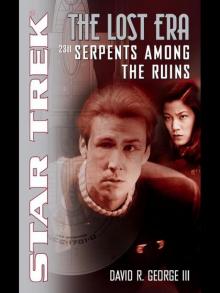 Serpents Among the Ruins
Serpents Among the Ruins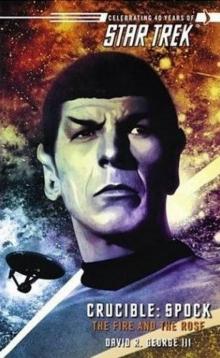 The Fire and the Rose
The Fire and the Rose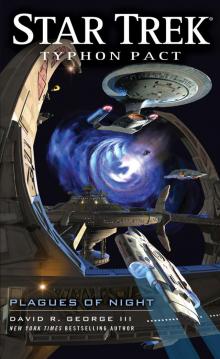 Star Trek: Typhon Pact 06: Plagues of Night
Star Trek: Typhon Pact 06: Plagues of Night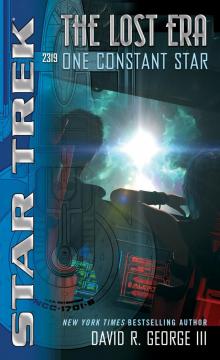 Star Trek: The Lost Era - 08 - 2319 - One Constant Star
Star Trek: The Lost Era - 08 - 2319 - One Constant Star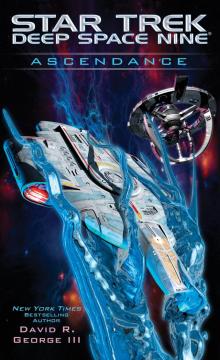 Star Trek: Deep Space Nine: Ascendance
Star Trek: Deep Space Nine: Ascendance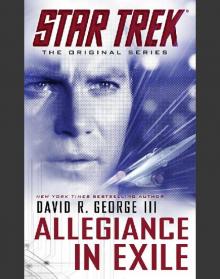 Star Trek: TOS: Allegiance in Exile
Star Trek: TOS: Allegiance in Exile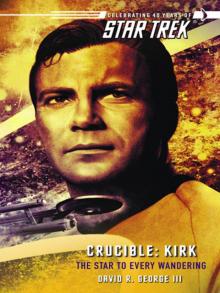 Crucible: Kirk
Crucible: Kirk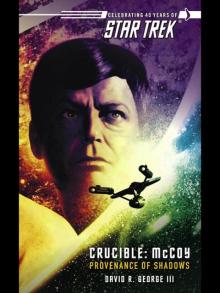 Crucible: McCoy
Crucible: McCoy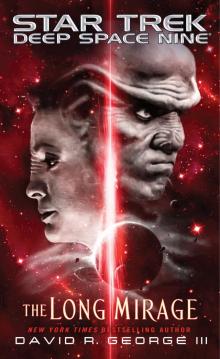 The Long Mirage
The Long Mirage Original Sin
Original Sin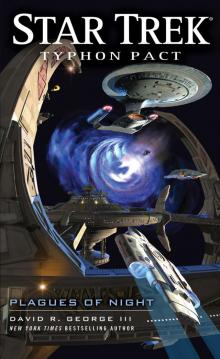 Star Trek: Typhon Pact: Plagues of Night
Star Trek: Typhon Pact: Plagues of Night Allegiance in Exile
Allegiance in Exile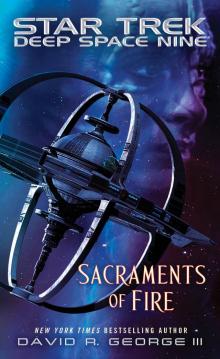 Sacraments of Fire
Sacraments of Fire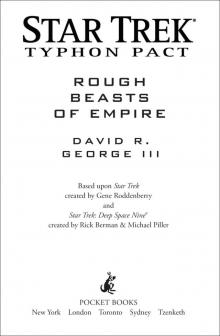 Star Trek: Typhon Pact: Rough Beasts of Empire
Star Trek: Typhon Pact: Rough Beasts of Empire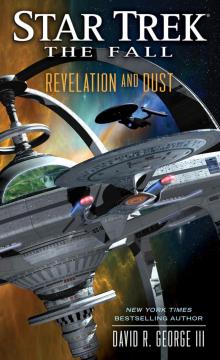 Star Trek: The Fall: Revelation and Dust
Star Trek: The Fall: Revelation and Dust